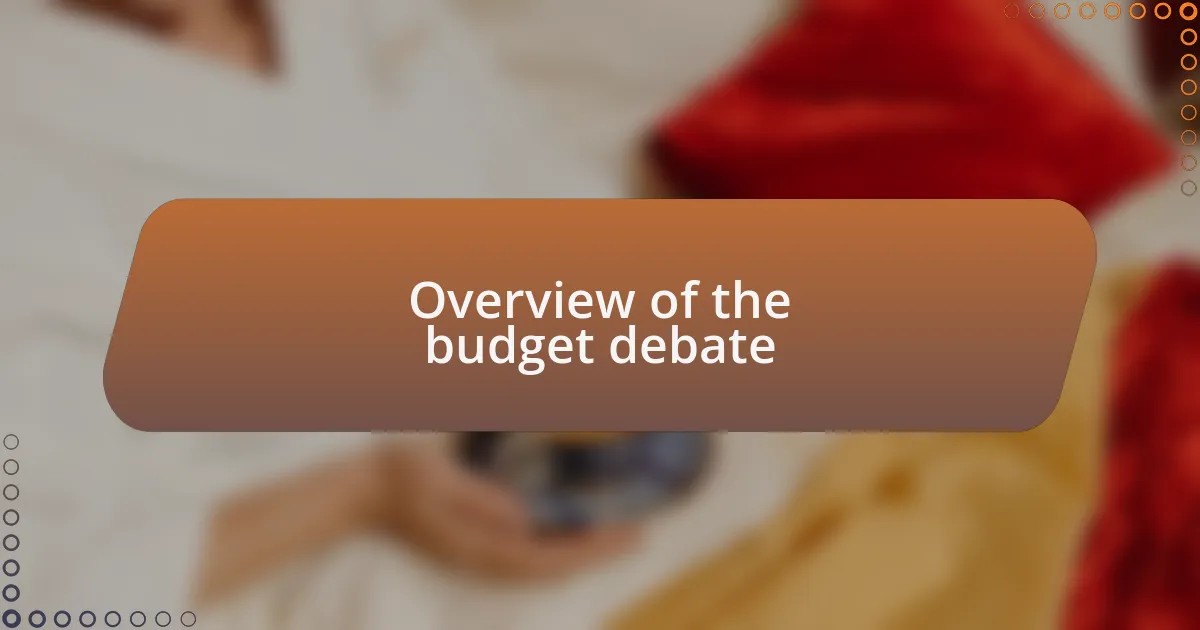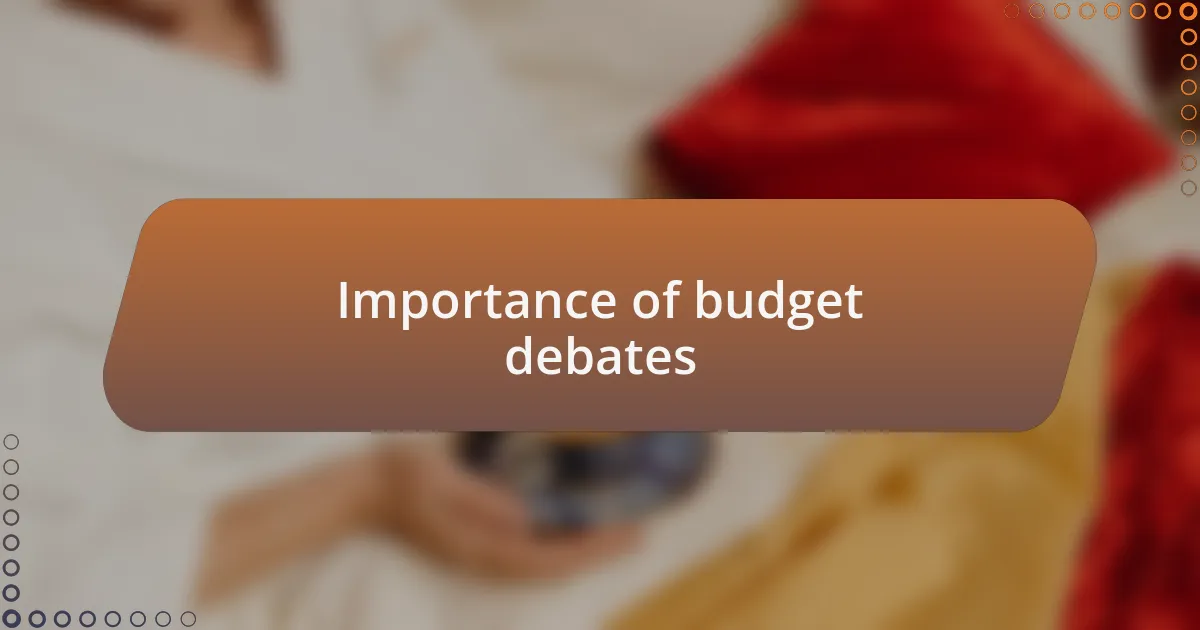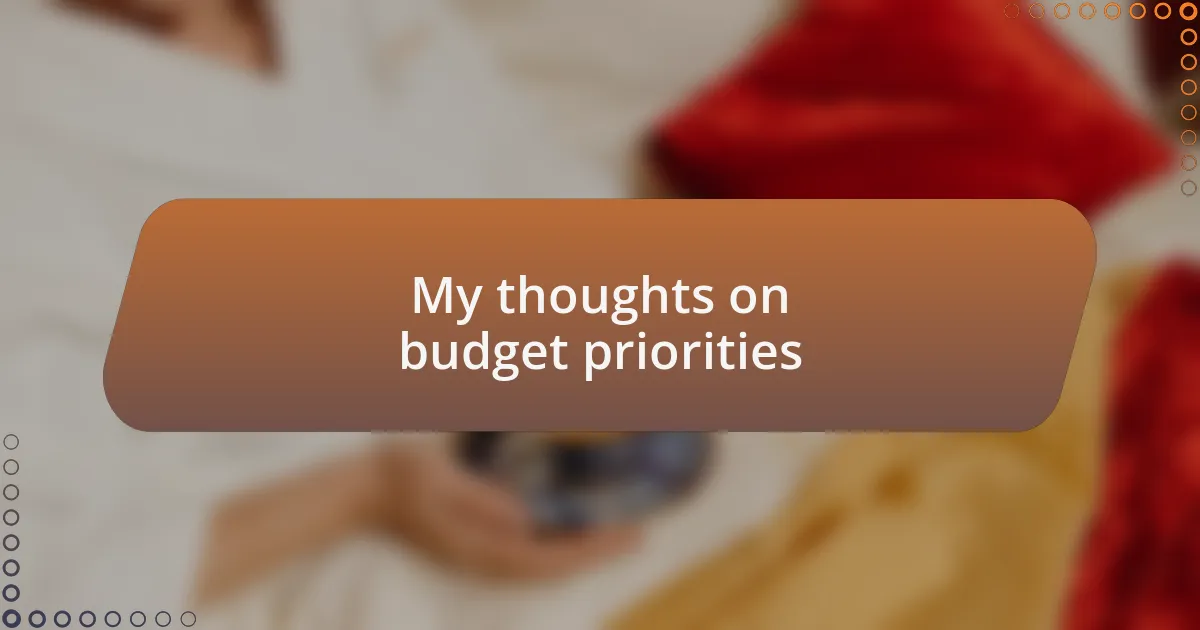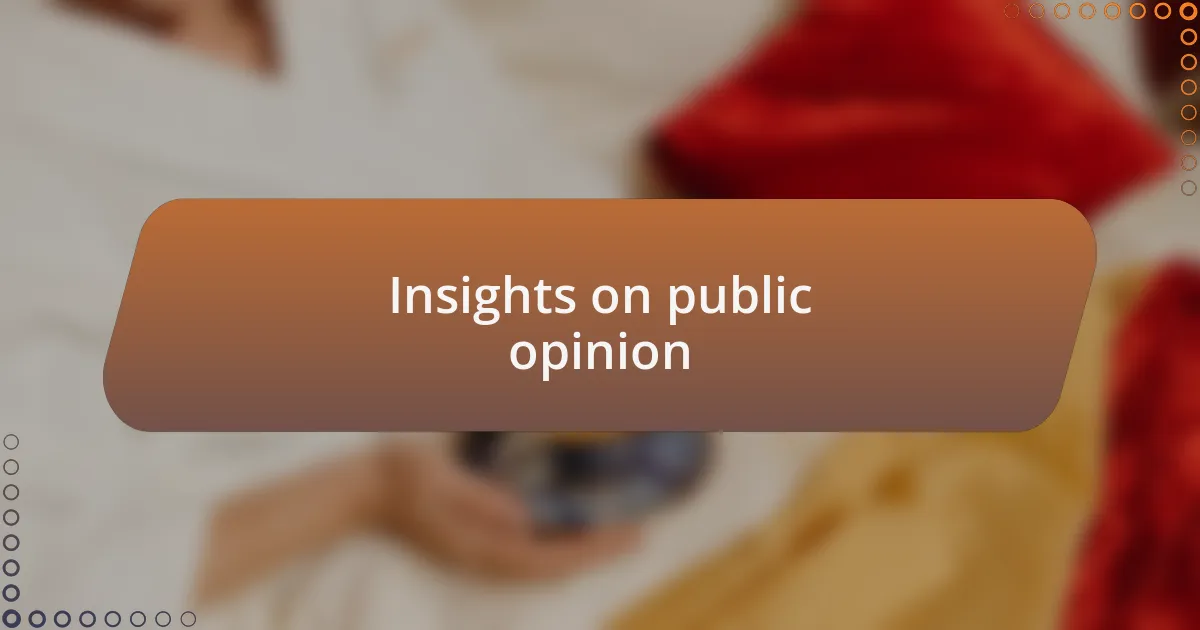Key takeaways:
- The budget debate reveals the tension between political agendas and the needs of everyday citizens, emphasizing the importance of funding for essential services like education and healthcare.
- Public opinion on budget discussions is often divided, highlighting the necessity for greater inclusivity and accessibility to reflect the diverse needs of communities.
- Storytelling and clear communication during budget debates can foster connection and engagement, making discussions more impactful and relatable for citizens.
- The debate underscores the need for responsiveness from legislators to enhance accountability and community trust in budgetary decisions.

Overview of the budget debate
The budget debate this year has been a whirlwind of opinions and perspectives, revealing the financial priorities of our government. As I watched, I couldn’t help but feel the tension in the room—how can we ensure that the needs of everyday Filipinos aren’t overshadowed by political agendas? The discussions were filled with passionate arguments, highlighting not just numbers, but the real impact these decisions have on our lives.
It was intriguing to see how various sectors, from education to healthcare, advocated for their share of funding. I found myself thinking about my experiences in education; how important it is to allocate resources that can actually uplift learning environments. Were the voices of teachers and students being heard in those deliberations? Often, I felt that the focus was more on political gain rather than genuine progress.
I was struck by the emotional weight that some representatives carried as they spoke about their constituencies. Watching them passionately defend their constituents’ interests made me reflect on my role as a citizen; how can I stay informed and hold my leaders accountable? It’s clear that this debate is not just about budgets but about the future of our communities.

Importance of budget debates
When I reflect on the importance of budget debates, I realize they serve as a crucial platform for transparency and accountability. It’s more than just figures on a page; it’s where our priorities as a nation are laid bare. I remember feeling a sense of responsibility to understand how funds allocated to social services directly impact my neighbors’ daily lives. Are we investing in programs that uplift our community, or are we missing the mark?
These debates also ignite essential conversations about equity and representation. Listening to representatives defend their constituents made me think about the voices that often go unheard. I found myself wondering, how can we foster an environment where every sector, especially the marginalized, feels prioritized in these discussions? The urgency in their speeches resonated with me, reminding me that behind every budget line is a story and a need that deserves attention.
Moreover, budget debates ultimately shape policy directions that affect generations to come. I couldn’t help but recall a time when funding cuts directly impacted the local school I attended. The ripple effects can be profound, influencing everything from class sizes to access to essential resources. Watching these discussions unfold, I felt a mixture of hope and concern—what choices are we making today that will either support or hinder our future? Engaging in these debates, even as spectators, reinforces our collective responsibility to advocate for a budget that genuinely reflects the needs of our society.

My thoughts on budget priorities
When considering budget priorities, I often think about the areas that truly impact daily life. For instance, when education funding is pushed to the side, it hits close to home for many of us. I still remember the struggle my friends and I faced accessing learning materials in high school due to budget cuts. How can we expect our youth to excel if we’re not investing in their future?
I feel a strong urgency to advocate for healthcare in budget discussions. My grandmother’s health significantly improved when we received proper medical assistance, yet many still fall through the cracks. How can we justify cuts to crucial services that support the most vulnerable among us? Every time I hear someone speak about funding priorities, I can’t help but think of the stories of those who are fighting for their health, their livelihoods, and their dignity.
Additionally, I notice that our cultural programs often get overshadowed in the quest for economic growth. When I attended a local art festival that highlighted Filipino talent, it dawned on me how essential these initiatives are for community cohesion. They foster unity and pride, but they require funding to thrive. What if prioritizing cultural investments could also enhance tourism and local economies? It’s an intricate balance that we need to explore further.

Insights on public opinion
When it comes to public opinion on budget discussions, I’ve noticed there’s often a sharp divide. Some people are passionate about prioritizing social programs like education and health, while others focus primarily on infrastructure. I recently chatted with a friend who argued passionately for more roads and bridges, insisting they drive economic growth. Isn’t it interesting how perspectives can differ so drastically based on individual experiences?
I’ve also realized that many citizens feel disconnected from these discussions. After a recent community forum, I left with a sense of frustration; not enough people voiced their concerns or ideas. It made me wonder, how can we make budgeting more accessible and inclusive? If more of us shared our stories, perhaps public opinion would more strongly reflect the diverse needs of our communities.
One thing that struck me during the budget debate was how emotions often fuel opinions. I saw people tear up when discussing cuts to environmental programs that protect our natural resources. This connection to something larger than ourselves is what resonates. How can we harness that emotional drive to better advocate for programs that preserve our environment for future generations? The more we share our passions, the more compelling the conversation becomes.

Lessons learned from the debate
The budget debate taught me that clarity is crucial. I watched as some speakers overwhelmed the audience with jargon. It reminded me of the times I’ve struggled to follow complex discussions at community meetings. When officials simplify their messages, we all benefit—how can we encourage clearer communication in future debates?
Another lesson I took away was the power of storytelling. One senator shared a personal tale about how funding cuts to education affected his hometown. I could feel the weight of his words in the room, as many of us have similar stories. Shouldn’t we encourage more leaders to connect with us on this personal level to create a sense of unity in our budget discussions?
Finally, the debate reinforced the importance of responsiveness. When a point was raised about healthcare funding, I noticed some legislators quickly reacted with supportive comments, while others seemed indifferent. It made me think: how can we hold our leaders accountable to truly listen and respond to the needs of their constituents? Engaging in a genuine dialogue could reshape future budget priorities and strengthen community trust.